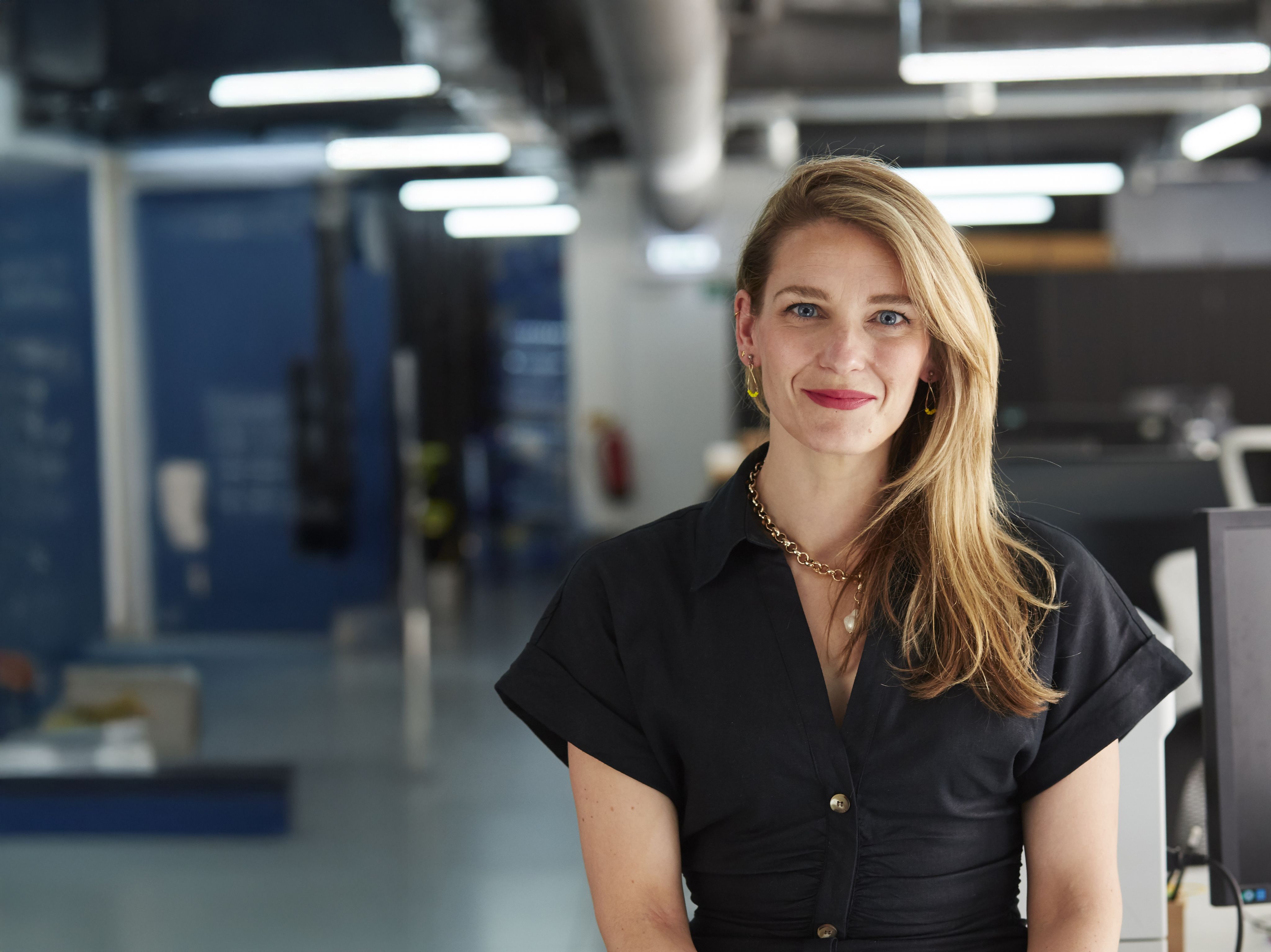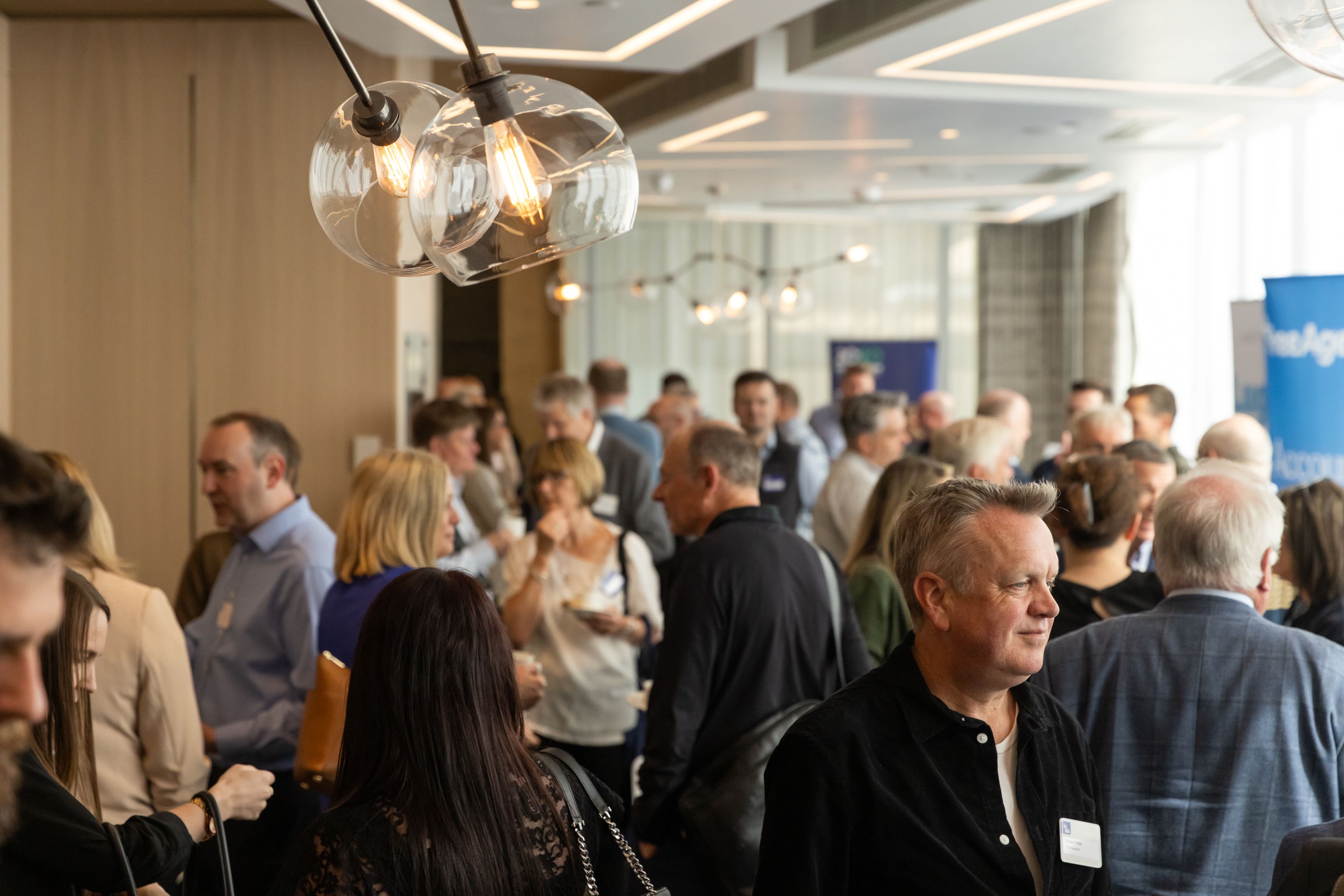Science of storytelling
Ahead of her keynote at the ICAS Practice Conference in June, behavioural strategist, executive coach and accountancy entrepreneur Alex Bond Burnett talks to Julie Burniston about culture, communication and better conversations
Photographs: Chris Bracewell

Science of storytelling

As behavioural science steps out of academia and into the heart of modern business strategy, few are harnessing its power as effectively as Alex Bond Burnett. Academy Manager at Cowry Consulting, and self-employed behavioural strategist and executive coach, Bond Burnett is on a mission to help organisations understand how people really think, feel and act, and what that means for leadership, performance and long-term success.
Her work lies at the intersection of psychology, communication and business transformation. At Cowry, she leads the academy that delivers behavioural science programmes.
She’s also the founder of Bold Behaviour Lab, where she helps leaders master storytelling, influence and cultural change at scale. Her signature method fuses evidence-based behavioural science with executive coaching and performance management, equipping professionals to lead with clarity and communicate in ways that drive results.
Her work has helped CEOs reposition themselves to attract new partnerships, clients and investments; supported teams in overcoming resistance to launch successful digital adoption campaigns; enabled businesses to secure six-figure investments that exceeded targets by 50%; and empowered people to gain promotions, improve performance and deliver measurable outcomes.
From ledgers to the limelight
Bond Burnett’s background bridges finance, theatre, behavioural science and coaching – an eclectic mix that might sound unorthodox, but which, she explains, is a natural fit.
“My family is a blend of extremes,” she says. “On one side, storytellers and creatives, journalists and big communicators. On the other, bankers, spreadsheets and structure. I grew up with both the Sunday papers and ledger sheets, drama rehearsals and budget reviews.”
At school, she was equally drawn to maths and theatre, bouncing between logic and expression. A recent ADHD diagnosis has helped clarify this duality. “I think I avoided more academic paths, like psychology, because the idea of sitting still and writing essays felt impossible,” she says. “But theatre? It was practical, embodied and made total sense to me.”
Bond Burnett began her career in finance, working in accounts payable before joining GE Corporate in 2006. “We were transforming European VAT processes from stapled receipts to automation,” she says. “I loved it. It was essentially very fancy bookkeeping, and it stuck with me.”
In her early twenties, she made the leap to drama school. On completing her diploma, she became an education manager, delivering performance-based workshops across the south-east with a team of 200. “We started using theatre anthropologically to connect, build confidence and shift behaviour,” she explains.
In 2014, she transitioned into consultancy, launching her business Ambition: Impact, working as a talent development consultant, speaker, facilitator and executive coach. But, like many creatives, she faced a familiar challenge – inconsistent income.
“My husband suggested bookkeeping,” she says, “so I launched Blue Arrow Accounting in the same year. It was meant to be part-time, but I quickly realised it could be much more.”
Drawing on her experience at GE, Bond Burnett adopted cloud technology early, using tools such as Receipt Bank and Xero. She hired bookkeepers and chartered accountants, scaled up, and soon built a thriving firm.
“In accounting and finance, you’re not just crunching data – you’re the custodian of a business’s most important insights”
“The way I could explain tax and finance in human language made all the difference. Let’s face it, money is emotional. It’s shame, ego, fear. And most people are too afraid to ask for help.”
She also discovered an untapped talent pool: highly qualified women in rural areas looking for flexible work: “One of them said, ‘It was either stacking shelves or cleaning.’ And I thought, but you were a finance director!”
In 2020, Bond Burnett deepened her expertise and is now professionally certified by the International Coaching Federation.
“So yes, my career path sounds eclectic,” she reflects, “but it’s never felt random to me. Whether it’s tax, theatre or behavioural science, it’s all about helping people feel more in control, more confident, more connected. It’s all storytelling. Just with different tools.”
Speaking numbers
Today, Bond Burnett brings her broad range of expertise to professionals across many sectors, including finance.
“I’ve worked with a lot of finance professionals over the years,” she says, “and the key issue often comes down to this: it’s not just about the numbers. It’s about giving the numbers a voice. I even ran a workshop under that exact title for years. In accounting and finance, you’re not just crunching data. You’re the custodian of a business’s most important insights. Whether people believe you or not, whether they act on your advice or not, that hinges entirely on how you communicate.
“A lot of professionals don’t realise just how much influence they already have. Coaching helps you become aware of that – how you show up, how you engage and what you’re unlocking in others. Whether you’re in a boardroom or over coffee, how you interpret and translate someone’s financials will directly impact the decisions they make.”
At the ICAS Practice Conference, Bond Burnett will speak on what she calls the science of storytelling – and it’s far from abstract. “Storytelling is one of the most powerful and efficient ways to build trust, communicate value and reduce resistance to change,” she says. “Whether you’re explaining a tax bill, onboarding new software or guiding a client through a tough year, the way you tell the story affects how it lands.
“People don’t just process data logically, they respond emotionally. Neuroscience shows that the brain processes financial pain in the same area as physical pain. That insight alone can radically change how you approach a client conversation. If you can bring empathy, clarity and structure into those discussions, the outcomes are better for everyone.”
Ahead of her keynote at the ICAS Practice Conference in June, behavioural scientist, executive coach and accountancy entrepreneur Alex Bond Burnett talks to Julie Burniston about culture, communication and better conversations
Photographs: Chris Bracewell
As behavioural science steps out of academia and into the heart of modern business strategy, few are harnessing its power as effectively as Alex Bond Burnett. Academy Manager at Cowry Consulting, and self-employed behavioural strategist and executive coach, Bond Burnett is on a mission to help organisations understand how people really think, feel and act, and what that means for leadership, performance and long-term success.
Her work lies at the intersection of psychology, communication and business transformation. At Cowry, she leads the academy that delivers behavioural science programmes.
She’s also the founder of Bold Behaviour Lab, where she helps leaders master storytelling, influence and cultural change at scale. Her signature method fuses evidence-based behavioural science with executive coaching and performance management, equipping professionals to lead with clarity and communicate in ways that drive results.
Her work has helped CEOs reposition themselves to attract new partnerships, clients and investments; supported teams in overcoming resistance to launch successful digital adoption campaigns; enabled businesses to secure six-figure investments that exceeded targets by 50%; and empowered people to gain promotions, improve performance and deliver measurable outcomes.
From ledgers to the limelight
Bond Burnett’s background bridges finance, theatre, behavioural science and coaching – an eclectic mix that might sound unorthodox, but which, she explains, is a natural fit.
“My family is a blend of extremes,” she says. “On one side, storytellers and creatives, journalists and big communicators. On the other, bankers, spreadsheets and structure. I grew up with both the Sunday papers and ledger sheets, drama rehearsals and budget reviews.”
At school, she was equally drawn to maths and theatre, bouncing between logic and expression. A recent ADHD diagnosis has helped clarify this duality. “I think I avoided more academic paths, like psychology, because the idea of sitting still and writing essays felt impossible,” she says. “But theatre? It was practical, embodied and made total sense to me.”
Bond Burnett began her career in finance, working in accounts payable before joining GE Corporate in 2006. “We were transforming European VAT processes from stapled receipts to automation,” she says. “I loved it. It was essentially very fancy bookkeeping, and it stuck with me.”
In her early twenties, she made the leap to drama school. On completing her diploma, she became an education manager, delivering performance-based workshops across the south-east with a team of 200. “We started using theatre anthropologically to connect, build confidence and shift behaviour,” she explains.
In 2014, she transitioned into consultancy, launching her business Ambition: Impact, working as a talent development consultant, speaker, facilitator and executive coach. But, like many creatives, she faced a familiar challenge – inconsistent income.
“My husband suggested bookkeeping,” she says, “so I launched Blue Arrow Accounting in the same year. It was meant to be part-time, but I quickly realised it could be much more.”
Drawing on her experience at GE, Bond Burnett adopted cloud technology early, using tools such as Receipt Bank and Xero. She hired bookkeepers and chartered accountants, scaled up, and soon built a thriving firm.
“In accounting and finance, you’re not just crunching data – you’re the custodian of a business’s most important insights”
“The way I could explain tax and finance in human language made all the difference. Let’s face it, money is emotional. It’s shame, ego, fear. And most people are too afraid to ask for help.”
She also discovered an untapped talent pool: highly qualified women in rural areas looking for flexible work: “One of them said, ‘It was either stacking shelves or cleaning.’ And I thought, but you were a finance director!”
In 2020, Bond Burnett deepened her expertise and is now professionally certified by the International Coaching Federation.
“So yes, my career path sounds eclectic,” she reflects, “but it’s never felt random to me. Whether it’s tax, theatre or behavioural science, it’s all about helping people feel more in control, more confident, more connected. It’s all storytelling. Just with different tools.”
Speaking numbers
Today, Bond Burnett brings her broad range of expertise to professionals across many sectors, including finance.
“I’ve worked with a lot of finance professionals over the years,” she says, “and the key issue often comes down to this: it’s not just about the numbers. It’s about giving the numbers a voice. I even ran a workshop under that exact title for years. In accounting and finance, you’re not just crunching data. You’re the custodian of a business’s most important insights. Whether people believe you or not, whether they act on your advice or not, that hinges entirely on how you communicate.
“A lot of professionals don’t realise just how much influence they already have. Coaching helps you become aware of that – how you show up, how you engage and what you’re unlocking in others. Whether you’re in a boardroom or over coffee, how you interpret and translate someone’s financials will directly impact the decisions they make.”
At the ICAS Practice Conference, Bond Burnett will speak on what she calls the science of storytelling – and it’s far from abstract. “Storytelling is one of the most powerful and efficient ways to build trust, communicate value and reduce resistance to change,” she says. “Whether you’re explaining a tax bill, onboarding new software or guiding a client through a tough year, the way you tell the story affects how it lands.
“People don’t just process data logically, they respond emotionally. Neuroscience shows that the brain processes financial pain in the same area as physical pain. That insight alone can radically change how you approach a client conversation. If you can bring empathy, clarity and structure into those discussions, the outcomes are better for everyone.”
ICAS Practice Conference:
Thrive in 2025
Date: 11 June 2025
Time: 9.00–18.00
Venue: Platform, 253 Argyle Street, Glasgow G2 8DL
Agenda
09.00: Registration
09.30: Opening remarks: Richard Sergeant, Managing Director, Principle Point
09.40: Panel session: Navigating challenges in a modern accountancy firm
Speakers: Karen Scholes CA, Deputy President, ICAS; Shona Campbell CA, Chair, Henderson Loggie; Jared Cordner CA, Operations Director, Ashton McGill
10.20: Cybersecurity in the digital age
Speakers: Kerrie Machin, Director of Business Development, Mitigo; Katie O'Neill, Head of Skills Academy, Cyber and Fraud Centre Scotland; Norman Stevenson, Incident Response and Threat Intelligence Manager, Cyber and Fraud Centre Scotland
11.00: Break
11.30: Panel session: From good to great: Building an attractive firm
Speakers: James Gosling, Managing Director, AJ Chambers; Allan Wilson, Managing Director, Wilson Partners
12.30: Lunch
13.35: Workshop: Stand out & get noticed: Unlocking LinkedIn’s power for accountants
Speaker: Ashley Leeds, Full Cup Coaching
14.20: Workshop: Practical applications of AI
Speaker: Will Rush, General Manager, XBert
15.00: Break
15.30: Keynote presentation: Voice, vision & value
Speaker: Alexandra Bond Burnett, founder, Bold Behaviour Lab
17.00: Closing remarks
17:15: Networking drinks
18.00: End of event
For full information and to register your place, click here

Her session will delve into narrative frameworks and vocal delivery techniques to enhance communication, especially in high-stakes scenarios.
“We’ll dive into tone, pace, body language – the full communication toolkit,” Bond Burnett explains. “There’s fascinating neuroscience behind how trust is built through voice and presence. We’ll workshop it too, so it will be very hands-on.”
Looking ahead, Bond Burnett sees both immense opportunity and responsibility for accountants. “Structural change is a huge theme right now,” she says. “Mergers, acquisitions, shifting leadership models – the traditional partner-led firm is evolving. And that means rethinking how we lead, attract talent and build cultures that last.”
The most successful firms, she believes, will be those that prioritise people: “There’s a huge opportunity for firms that invest in people, culture and leadership, particularly in areas like emotional intelligence, coaching and communication.
“Then there’s AI, the next major frontier. This is not just a tech issue, it’s an emotional and ethical one. Can we trust the tools? What do we automate, and what stays human? Every firm should consider having an internal AI lead, someone who ensures adoption is responsible. But just as importantly, we need human-first leadership. How do we talk about AI to our teams? How do we explain it to clients? These are emotional questions, not just strategic ones.”
Why inclusion matters
As a judge at the Accounting Excellence Awards, Bond Burnett has seen the real impact of intentional inclusion. “What stood out to me were the entries where people were clearly creating real, intentional change,” she says. “I remember one founder who was neurodiverse and had built a team and client base around that experience. It was powerful.”
For her, inclusion isn’t a tick-box exercise, but a business imperative: “It’s about who gets heard, who gets supported and who gets to thrive. That drives innovation, retention and engagement. Sometimes it’s small things – such as flexible working, inclusive language, how you recruit – that make a massive difference.”
When the conversation turns to personal branding, a hot topic in the profession, Bond Burnett offers a refreshingly different take. “This might be controversial, but I don’t think you need a personal brand,” she says. “What you need is presence.”
“The brain processes financial pain in the same area as physical pain. That insight alone can radically change how you approach a client conversation ”

That presence, she explains, is made up of three elements: “Your digital footprint, your professional profile and your real-world reputation. Clients are googling you. Colleagues are checking your LinkedIn. You don’t have to be loud or ‘TikTok famous’, but you do need to be clear, credible and consistent. Just sharing a blog or a LinkedIn post once in a while can set you apart.”
What’s the one thing Bond Burnett hopes CAs will take from her keynote? “That the real key to transformation, whether it’s in technology, leadership or client relationships, lies in understanding people. We focus so much on systems and processes, but it’s human behaviour, emotion and communication that make or break change. To understand behaviour is to understand decision making.
“If you want to lead transformation, you don’t just need better tools – you need better conversations.”
And that’s something every CA can benefit from.






